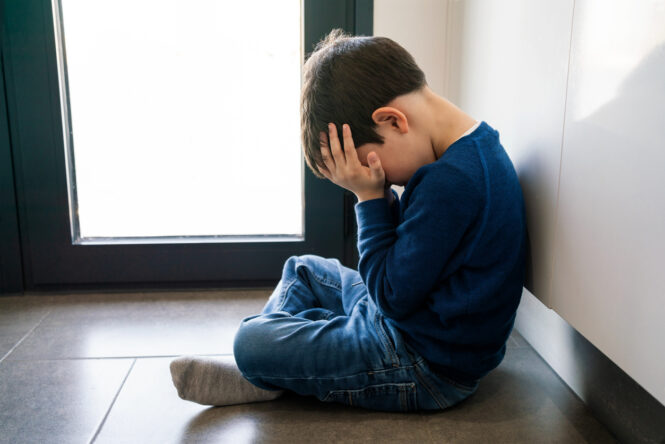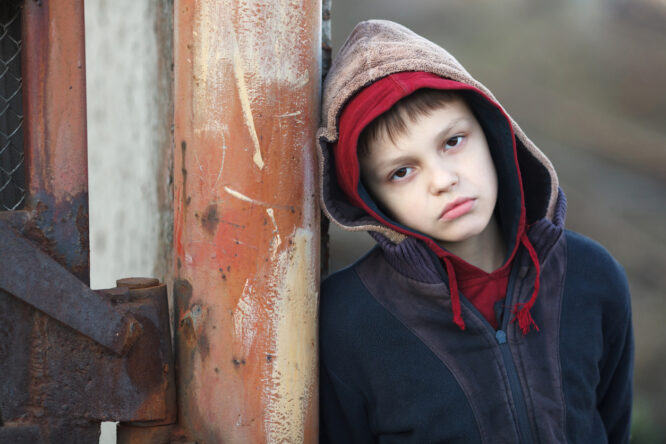When people talk about absent fathers, they often picture someone who physically left.

However, absence isn’t always about geography. Sometimes, a father is still there in the house—quiet at the dinner table, distracted in the living room, emotionally unavailable for years. Sadly, that kind of absence can leave deep, lasting marks that are hard to name, let alone process. If your father was never really there in the way you needed, you might be carrying feelings that don’t always show up as grief, but they stick around. Here are some of the complicated things you might be feeling because of it, even if you’ve never said them out loud.
1. You second-guess your worth in relationships.

If the first man who was supposed to love you unconditionally felt distant or uninterested, it can make you question what you’re worth to other people. You might find yourself wondering if you’re too much, not enough, or just not lovable in the way you hoped to be. This doubt can linger even in adult relationships, especially when it comes to trust and vulnerability. You’re not just reacting to what’s happening now—you’re reacting to what you didn’t get then.
2. You find comfort in self-reliance, even when you’re exhausted.

When you grow up with emotional gaps, you learn to take care of yourself early. And while that independence might look strong on the outside, it often comes with burnout, resentment, and a quiet longing for someone else to carry the weight once in a while. It’s not that you don’t want support, it’s that you don’t expect it to last. So, you handle things alone, even when you’re desperate not to.
3. You struggle to define how you feel about him at all.

It’s confusing when someone is technically in your life but emotionally absent. You might feel guilty for being angry, unsure if you’re allowed to grieve someone who was physically around but never showed up where it counted. It can leave you emotionally tangled—caught between what should have been and what actually was, with no clear place to put those feelings.
4. You carry emotional armour, even in safe spaces.

When you learn early that closeness isn’t reliable, you build walls. Maybe you joke your way through serious moments, shut down when things get intimate, or feel uncomfortable when people genuinely care. The fear isn’t just about getting hurt. It’s about being seen in a moment where no one shows up because that’s what your nervous system still expects.
5. You often feel like you’re on your own, even when you’re not.

That sense of emotional isolation can follow you into adulthood. You might be surrounded by people but still feel like you have to do life solo, especially when things go wrong. That’s not dramatics—it’s wiring. When the person who was supposed to protect you felt out of reach, your mind adapted by assuming support isn’t something you can count on.
6. You look for reassurance more often than you’d like to admit.

If you didn’t feel truly seen or valued by your father, it’s common to grow up craving affirmation. It’s not compliments or praise that you’re after necessarily, but simple confirmation that you’re doing okay, that you matter, that someone’s glad you’re here. That can manifest as people-pleasing, over-apologising, or constantly needing emotional feedback. It’s not neediness. It’s a response to emotional hunger that was never fed consistently.
7. You feel guilty when you’re angry at him.

Maybe he wasn’t cruel. Maybe he was just emotionally absent, wrapped up in his own world. Because of that, you might struggle to feel justified in your hurt or resentment. The thing is, grief doesn’t require a villain. You’re allowed to feel angry about what you didn’t get, even if no one meant to withhold it. Silence and emotional distance can leave wounds too.
8. You downplay your emotional needs.

When you’ve learned that expressing your needs leads to silence, defensiveness, or being brushed off, you eventually stop asking. You shrink your needs down. You convince yourself they’re not a big deal. However, those needs don’t disappear. They just get quieter and harder to name—until they leak out in ways you don’t expect, like burnout, bitterness, or emotional numbness.
9. You feel awkward around men who are emotionally available.

If emotional distance was the norm growing up, genuine openness can feel almost disorienting. When someone shows warmth, checks in with you, or expresses real care, part of you might want to lean in, and another part might freeze or pull away. That’s not because something’s wrong with you. It’s your nervous system adjusting to a different kind of connection than the one it was built around.
10. You crave closeness, but don’t fully trust it.

You might long for deep, steady connection, but when it shows up, you’re waiting for the moment it disappears. That push-pull dynamic can show up in friendships, romantic relationships, even at work. It’s exhausting, and it’s not about drama—it’s about safety. Part of you wants to believe in consistency. Another part still remembers what it was like to need someone who wasn’t emotionally present.
11. You wonder if your sadness is even valid.
 Source: Unsplash
Source: Unsplash Because nothing dramatic happened—no big fight, no dramatic exit—it’s easy to downplay your experience. You might even gaslight yourself into believing it wasn’t “that bad.” However, absence isn’t invisible. A missing presence still leaves an imprint, and your grief, confusion, or sadness doesn’t need a headline to be real.
12. You’re deeply sensitive to being dismissed or ignored.

Small moments where someone seems distracted, disinterested, or emotionally checked out can hit harder than expected. You might know logically it’s not personal, but emotionally, it taps into something older. These moments can feel like echoes. They bring up that same gut-level feeling of being overlooked or unimportant, even when the current situation is harmless.
13. You struggle to know what a ‘healthy father figure’ even looks like.

If you didn’t grow up with emotional guidance or warmth from your father, you might not have a template for what that should feel like. That can leave you feeling unsure, even sceptical, of people who try to step into that space in your adult life. Mentors, older friends, or supportive male figures might feel foreign, hard to trust, or difficult to connect with. And that confusion is totally valid, especially if no one ever modelled what safe, steady fathering really looked like.
14. You carry grief that doesn’t always have a name.

There’s a kind of grief that comes from what wasn’t there. Not a loss you witnessed, but a connection you needed and never really got. That grief can live quietly in the background, showing up as longing, restlessness, or unexplained sadness. You’re not being dramatic or overemotional. You’re responding to the emotional shape your childhood took, and naming that experience might be the first step toward making peace with it.




